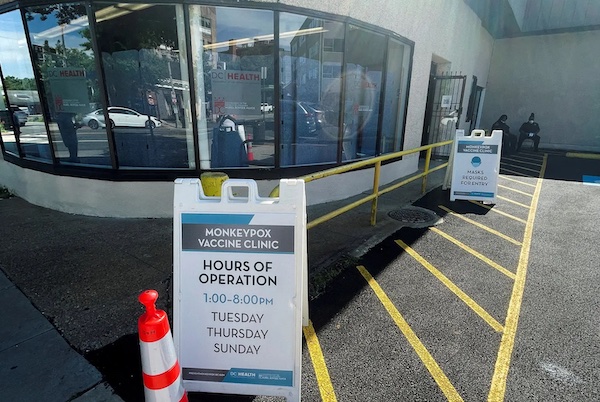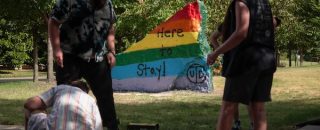While there are currently 780 confirmed monkeypox cases statewide, Texas cities are bracing for an increase in infections.
Dallas and Austin officials have declared monkeypox a public health emergency — bids both to get in line for federal funding and to send a message to residents that the virus is serious and painful and they should take precautionary measures while the vaccine is in short supply.
“As we’re running out of vaccine and medications, we want to engage our community and ask them to help us stem the tide, the spread of the disease,” Austin-Travis County Medical Director/Health Authority Dr. Desmar Walkes said on Tuesday. “And allow us the time to retool and refuel, as it were, and get what we need to treat people and to vaccinate people who are exposed to the virus.”
Texas’ major cities have received thousands of monkeypox vaccine doses and expect thousands more in the coming weeks, but a national shortage of the shot has officials and the people they’re trying to protect begging for more.
“It is not enough,” Austin Mayor Steve Adler said at a Tuesday news conference. “We need the federal government to do everything it can to increase the availability of medicine and vaccines to our community.”
There are 813 confirmed Texas cases of monkeypox, a contagious rash of painful lesions that can be debilitating but is not typically fatal, nor does it typically lead to hospitalization or long-term health problems. Some 9,491 cases have been documented in the U.S. during the current outbreak, more than any other country.
Monkeypox spreads through close, intimate skin contact with someone who has the virus, and the U.S. Centers for Disease Control and Prevention reports that many, though not all, of the reported cases have been among men who have sex with men, although that is not historically the community where the virus is typically found.
It is not a sexually transmissible disease because it does not require sex to be transmitted, but sex is how it’s commonly being spread currently, health officials said.
While this outbreak has hit some 89 countries so far, the virus had been largely contained in Central and West Africa for decades.
And while it is still negatively impacting those people, as more cases are reported, other demographics are starting to show up in the numbers, according to state data. Two weeks ago, 100% of the cases were in men who have sex with men. On Thursday, that percentage was down to 95%.
The idea of a public health emergency declaration may rekindle concerns about the sorts of business closures and other measures enacted during the early days of the COVID-19 pandemic, but the orders over monkeypox include none of those measures.
The declarations signal to the federal government that those areas are in need of more vaccines and medical tools to beat back the contagion.
But those enacted in Dallas and Austin, officials say, are mainly to raise awareness of the disease and encourage those most at risk to do what they can to slow the spread while the community waits for more vaccine to become available.
Officials are asking residents to wash their hands, avoid direct skin-to-skin contact and isolate themselves if they get sick. They also want people to take precautions as a means of avoiding further financial strain in a tough economy amid inflation and rising housing costs.
“If you become ill, you will have to isolate at home until you recover,” Walkes said Tuesday. “That’s going to be a financial drain on you and your family.”
Rising cases and a vaccine shortage
The call for awareness comes as state and federal officials scramble for vaccine doses to contain the virus as it spreads faster each week.
Similar to the motives and messages behind the local orders, the U.S. Department of Health and Human Services Secretary Xavier Becerra declared monkeypox a public health emergency in order “to unlock additional tools that will help us contain and end this outbreak, and to signal to the American people that we are taking our response to the next level,” Becerra said.
The monkeypox vaccine shortage is attributed to supply chain problems, with an unprecedented worldwide demand in countries that had rarely, if ever, seen the virus on their own soil.
The CDC has said more doses are being procured but that the vaccine may not be widely and easily available until at least next year.
The Texas Department of State Health Services is sending more than 28,000 doses doses to public health departments this month, officials said.



